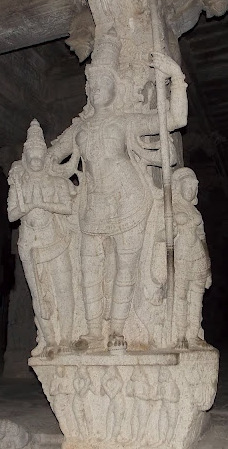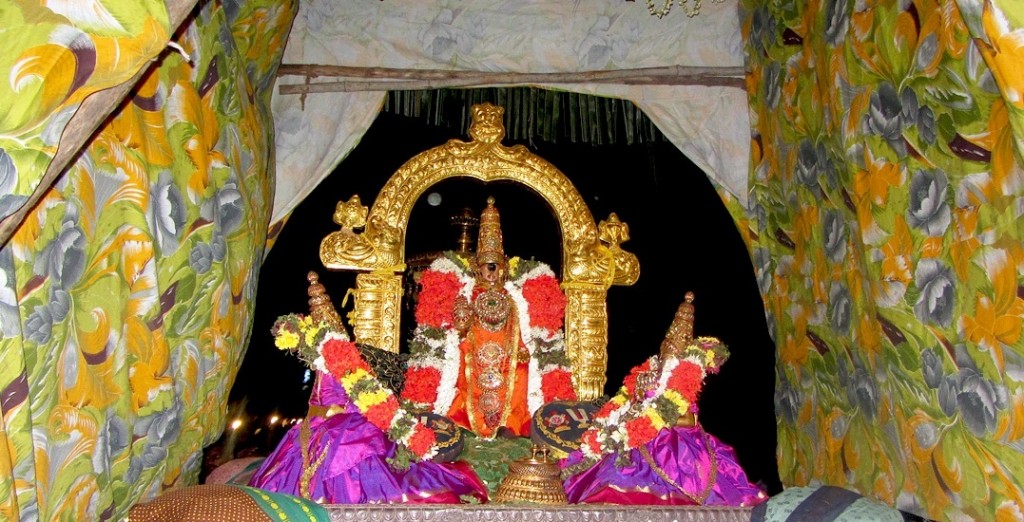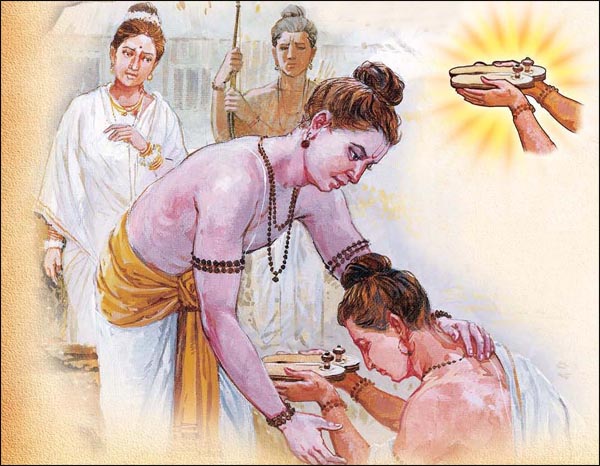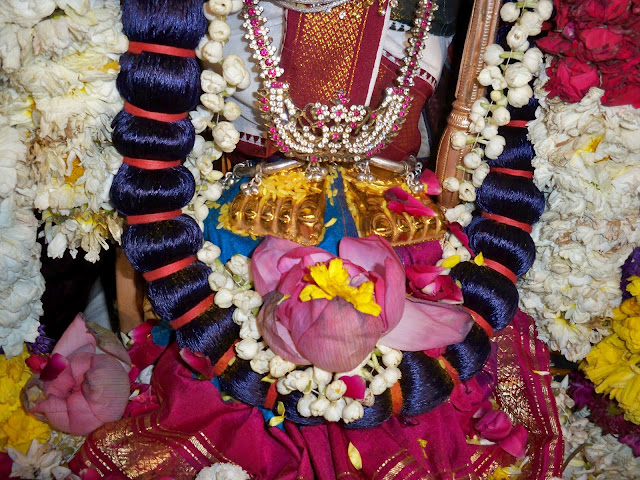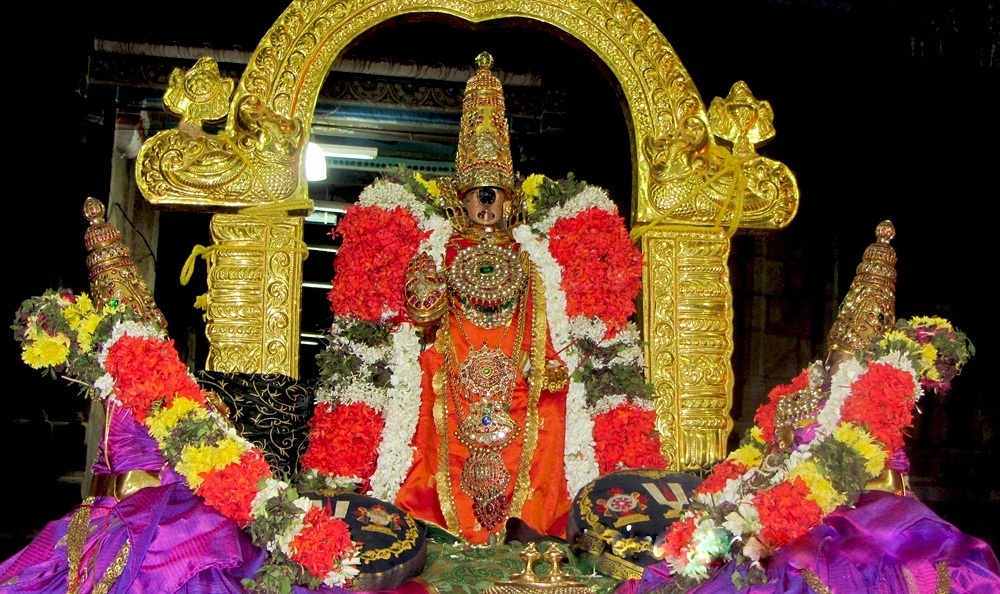28. SubhAshitha Paddhathi
Introduction: This Paddhathi has ten slOkams. After describing the identity of the PaadhukAs from Chapter fifteen to the twenty seventh chapter, Swami Desikan now starts to prove that the PaadhukAs are serious objects of worship. He proves his points through number of learned sayings based on the lOka neethis (worldly observances/laws).
Sloka #821
821. kalAsu kAShTAmAthiShTan BhUmrE sambanDhinAmapi
pAdhukA rangaDhuryasya BharathArADhyathAm gathA
Meaning (translated by Sri. U.Ve. V.N. Vedanta Desikan)
One who is adept in the field of fine arts bestows a kind of popular respectability even on his near and dear ones. (The moon,with sixteen digits, the full moon, makes the ocean swell in joy; it also blossoms the water-lily. A person of wealth confers a stature on his relatives, too, according to Brihadaranyaka.
A master artist on the stage impresses by his foot work, any connoisseur of the dance-art. The Lord of Ranga enjoys a similar fame. His Paaduka became a worshippable object to Bharata.
Special Notes from Sri. U.Ve. V. Sadagopan
1) UtthamUr Swamy’s anubhavam: For those, who have mastered any single art, that artistry confers merit and respect on all of those associated with them. Hence, it is no wonder that RanganAtha PaadhukAs are worshipped by those, who understand the rules of Bharata nAtyam, since the PaadhukAs particpate in the dance-drama conducted by RanganAtha at SrIrangam. The literal meaning is that the PaadhukAs of the Lord are worshipped by BharathA. The PaadhukAs became object of worship because of their close relationship to RaamA, who is none other than RanganAtha.
2) SrImath Andavan’s anubhavam: In this Paddhathi, Swamy Desikan provides meanings for some of the actions of Lord Raamachandra as outlined in SrImath RaamAyaNam. PerumAl took different incarnations to generate true Jn~Anam in chEthanams. Therefore Swamy Desikan includes the meaning of selected actions of the Lord in this Paddhathi. Bharathan worshipped SrI Raama Paadhukais. This act signifies that a great personage spreads his glory to all associated with him. This is why Bharathan worshipped the Paadhukai associated with SrI Raamachandra.
3) One who is the top leader in any art (KalAsu KaashtAm aathishtAn) extends his glory even to those associated with him (sambhandhinAmapi bhUmnE bhavathi). That is why the PaadhukAs of RanganAtha, who incarnated as Raamachandran became fit for the worship by Bharatha (Rangadhuryasya PaadhukA Bharatha–aarAdhyathAm gathA )….(V.S).
28. ஸுபாஷித பத்ததி
821. கலாஸு காஷ்டாம் அதிஷ்டந் பூம்நே ஸம்பந்திநாமபி
பாதுகா ரங்க துர்யஸ்ய பரத ஆராத்யதாம் கதா
பொருள் – கலைகளில் தேர்ச்சி பெற்று அதன் உச்சத்தை அடைந்தவன், தன்னைச் சேர்ந்தவர்களுக்கு பெருமை உண்டாக்குபவனாக ஆகிறான். நாடகங்களை நிகழ்த்துவதில் வல்லவனாகிய ஸ்ரீரங்கநாதனின் பாதுகை, பரத சாஸ்த்ர நிபுணர்களால் (பரதனால் என்று சிலேடை) கொண்டாடப்படுகிறது.
Sloka #822
822. santha: svadEshaparadhEshaviBhAgashUnyam
hantha svavrutthimanaGhAm na parithyajanthi
rAjyE vanE cha raGhupungavapAdharakshA
naIjam jahoU na Khalu kaNtakashODhanam thath
Meaning (translated by Sri. U.Ve. V.N. Vedanta Desikan)
Good people will never forsake their duties, whether they be in their own place or in a strange place outside. It is their nature. Sri Rama’s Paaduka performed its duty of ‘thorn-removal’ in this manner. In the Ayodhya kingdom, it saw to it that no enemy force ever entered into the land; in the forest, it safeguarded Rama’s feet from the thorns on the way.
Special Notes from Sri. U.Ve. V. Sadagopan
1) UtthamUr Swamy’s anubhavam: Here, Swamy Desikan points out that one should never abandon one’s own dharma for whatever reasons.He says: “Righteous people will not abandon their codes of conduct learnt from their teachers either in their ownland or foreign lands. For instance, Raama PaadhukAs performed their assigned duties be they were in AyOdhyA or in the DaNDakA forest. In AyOdhyA , it made sure that the enemies of the kingdom do not cause any harm to the citizens; in the forest, they protected RaamA’s feet from thorns and stones.
2) SrImath Andavan’s anubhavam:The great ones execute their duties without concern about time, place or state in an identical manner. They will not change their way because it is day or night, different locales and other dhvandhvams. That is why, SrI Raama Paadhukais performed ” kaNDa sOdhana vrutthi” equally well in the forest as well as in the kingdom. In the forest, it freed the area from the thorns; in the kingdom, it freed the land of enemies to the land. The inner meaning is that the AchAryAs do not perform auspicious deeds for any one in particular. They perform these acts because it is their svabhAvam to do so.
3) The great ones do not abandon their noble activities because it is their own home country or a foreign country (Santha: svadEsa paradEsa vibhAga soonyam anagAm svavrutthim na parithyajanthi). That is why, the Raama PaadhukAs freed the forest as well as the kingdom free from thorns ( Raghupungava PaadharaksdhA rAjyE, vanEapi tath naijam kaNDasOdhanam na jahou khalu ) …(V.S)
822. ஸந்த: ஸ்வதேச பரதேச விபாக சூந்யம்
ஹந்த ஸ்வவ்ருத்திம் அநகாம் ந பரித்யஜந்தி
ராஜ்யே வநே ச ரகுபுங்கவ பாதரக்ஷே
நைஜம் ஜஹௌ ந கலு கண்டக சோதநம் தத்
பொருள் – சிறிதும் குற்றங்கள் இல்லாத தங்கள் கர்மங்களைப் பெரியவர்கள் தங்கள் ஊராக இருந்தாலும், வெளியூராக இருந்தாலும் கைவிடுவதில்லை. இது போன்று இராமனின் பாதுகையானது ராஜ்யத்திலும் கானகத்திலும் கண்டகசோதனம் என்பதைச் செய்தபடி இருந்தாள்.
விளக்கம் – கண்டகசோதனம் என்றால் முள் இல்லாமல் செய்வது ஆகும். கானகத்தில் முள் என்பது, ராஜ்யத்தில் சத்ருக்கள் என்று கருத்து.
Sloka #823
823. brahmAsthrathAmaDhijagAma thruNam prayuktham
puNyam sharavyamaBhavathpayasAnniDhirvA
pruThvIm shashAsa parimukthapadham padhathram
kim vA na kim Bhavathi kELiviDhoU viBhUnAm
Meaning (translated by Sri. U.Ve. V.N. Vedanta Desikan)
Look at what a competent person can achieve. (1) A thin grass became a potent Brahmastra in Rama’s hand (2) An arrow could swallow, as it were, the (invisible) Punya of Parasurama and could dry up the ocean (3) A Paaduka that knows only to protect the feet became the ruler of a vast country. In the hands of the adept, anything can be anything as he wants.
Special Notes from Sri. U.Ve. V. Sadagopan
1) UtthamUr Swamy’s anubhavam: Swamy Desikan points out here another lOka neethi , which states that those associated with the Lord can accomplish many things because of their special relationship to the Lord. He says: “A mere blade of grass got empowered to become the powerful BrahmAsthram. At another time, all the virtues collected by ParasurAma was put away by the arrow of RaamA in to the ocean. The PadhukAs although seperated from the Lord’s feet ruled over the universe at AyOdhyA. When those with true power conduct the affairs, which object can not be empowered to perform miracles?
2) SrImath Andavan’s anubhavam: If one is an expert, he can use any object to execute what he wishes to do. For the Lord, simple blade of grass performed the duties of the powerful BrahmAsthram. Through this extraordinary power of RaamA, ParasurAmA’s puNyam ( not visible to the eye) was hit by His arrow, the ocean became the target for drying by His missile. His (Raama) PaadhukAis were enthroned at AyOdhyA and they ruled the kingdom for fourteen years on His behalf.
3) In the case of even the playful activities of the most powerful ones (vibhUnAm kELi vidhou), what object can not transfrom in to any other objects? (kim vaa kim na bhavathi?). In the case of Lord Raamachandra, a blade of grass became BrahmAsthram (prayuktham thruNam BrahmAsthrathAm adhijagaama); ParasurAmA’s puNyam became the target of Raama BhANam (puNyam saravyam abhavath); the Ocean became the object of evaporation ( payasAm nidhirvaa saravyam abhavath). The Paadhukais freed from the sacred feet of the Lord (Parimuktha padham padhathram) was empowered to protect the universe (Padhathram pruTveem SaSAsa )…(V.S).
823. ப்ரஹ்மாஸ்த்ரதாம் அதிஜகாம த்ருணம் ப்ரயுக்தம்
புண்யம் சரவ்யம் அபவத் பயஸாம் நிதிர்வா
ப்ருத்வீம் சசாஸ பரிமுக்த பதம் பதத்ரம்
கிம் வா ந கிம் பவத் கேளிவிதௌ விபூநாம்
பொருள் – ஸ்ரீராமனின் திருக்கரம் கொண்டு எறிந்த புல்லானது ப்ரஹ்மாஸ்திரம் ஆனது. அவனுடைய பாணத்திற்குப் பரசுராமனின் புண்ணியமும், ஸமுத்திரமும் (இரண்டுமே குறிபார்ப்பதற்கு இயலாதவை) இலக்காக நின்றன. அவனுடைய பாதுகைகள் திருவடிகளைக் காப்பதை விட்டு, இந்த உலகம் முழுவதையும் காப்பாற்றினாள். வல்லவர்களின் விளையாட்டில் எந்தப் பொருள்தான் எந்தப் பொருளாக மாறாது?
Sloka #824
824. anyEShu sathsvapi narEndhrasuthEShu dhaIvAdh
BraShta: padhAdhaDhikarOthi padham padhArha:
prAyO nidharshayathi thath praThamO raGhUNAm
thathpAdhayO: prathiniDhI maNipAdhukE vA
Meaning (translated by Sri. U.Ve. V.N. Vedanta Desikan)
There is a golden rule illustrated in the lives of Rama and Rama-Paaduka; When one merits as his due post may miss him first but it will sirely reach him ultimately. Rama lost the crown by divine order, perhaps, but then none of his brothers could acquire it. He got it finally, as it was his dure, he being the eldest. So also the Paaduka missed the padam (Rama’s foot) but it got the padam, namely, the office of the ruler of the kingdom.
Special Notes from Sri. U.Ve. V. Sadagopan
1) UtthamUr Swamy’s anubhavam : Swamy Desikan states here that one lOka neethi was established from the concepts of PaadhukA rAjyam and Raama Raajyam. He says: ” Although there were other sons of DasaraTa, the blemishless Raama for no fault of His, lost the rights to the throne of Raghus. The PaadhukAs of RaamA, which are equal in merit to Him also underwent the same experience, when they were sepearated from Him for fourteen years. ” RaamA for no fault of His, lost the chance to ascend the throne of Raghus due to the boons of KaikEyi. Similarly, the PaadhukAs eligible to be worthy of RaamA got seperated from their Lord for no fault of their own. Ultimately, RaamA ascended the throne and the PaadhukAs got united with RaamA’s feet.
2) SrImath Andavan’s anubhavam: Lord Raamachandra”s coronation at AyOdhya was stopped after it was well planned. Even if it was halted at that time, that crowning uthsavam for Him took place few years later. Even during the time of interruption, when His brothers were still eligible for ascending the throne, the Paadhukais became fit to occupy the throne of Raghu vamsam.
3) Even if there were other sons (of King DasaraTa ) there (anyEshu narEndhra suthEshu sathsvapi ), the fittest one, who lost the opportunity to sit on the throne of His father due to dhaiva sankalpam ultimately ascended the throne ( dhaivAth padhAth brashta: , padhArha: padham adhikarOthi). This was demonstrated in the case of the greatest one of Raghu Vamsam (RaghUNAm PraTama:), Raamachandran . He could not ascend the throne due to dhaivasankalpam. His brothers were there at that time , when He had to give up His throne and yet the throne went to His Paadhukais instead (Tath RaghUNAm PraTama: tath PaadhayO: prathinidhi PaadhukE vaa nidarsayathi prAya:) ….(V.S).
824. அந்யேஷு ஸத்ஸ்வபி நநேந்த்ர ஸுதேஷு தைவாத்
ப்ரஷ்ட: பதாத் அதிகரோதி பதம் பதார்ஹ:
ப்ராயோ நிதர்சயதி தத் ப்ரதமோ ரகூணாம்
தத்பாதயோ: ப்ரதிநிதீ மணிபாதுகே வா
பொருள் – தெய்வத்தின் ஸங்கல்பம் காரணமாக, அரச பட்டத்திற்குத் தகுதி படைத்த ஒருவன் அதனை நழுவவிட்டாலும், சிறிது காலம் கழித்து அடைந்துவிடுகிறான். இதனை ரகுவம்சத்தின் சிறந்தவனான இராமன் காண்பிக்கிறான். அவனுடைய திருவடிகளின் ப்ரதிநிதிகளான இரத்தினக்கற்கள் பதிக்கப்பட்ட பாதுகைகள் உணர்த்துகிறாள்.
விளக்கம் – ஒருவனுக்கு ஒரு பதவி கிட்ட வேண்டும் என்றால், அந்தப் பதவியானது ஒருமுறை இல்லாவிட்டாலும் மற்றோரு முறை அவனைத் தேடி வந்துவிடும். இராமன் அரசபதவி ஏற்பது தடைபட்டாலும், அவன் தம்பிகள் உள்ள போதிலும் அவனது பாதுகைகள் அல்லவோ அரச பதவியைப் பிடித்தாள்?
Sloka #825
825.charaNamanaGhavrutthE: kasyachithprApya nithyam
sakalaBhuvanagupthyaI sathpaThE varthathE ya:
narapathibahumAnam pAdhukEvADhigacChan
sa Bhavathi samayEShu prEkshithajnaIrupAsya:
Meaning (translated by Sri. U.Ve. V.N. Vedanta Desikan)
Whosoever clings to the feet of a great good man of a flawless character, following his footsteps in the matter of all actions, especially in those designed for the good of the world, he will secure, as the paaduka secured, the respectability befitting the Royalty. Not only this: he would be served with respect by kings too; furthermore, he will have the previlege of being served by people who will look to his view for all implementations.
Special Notes from Sri. U.Ve. V. Sadagopan
1) UtthamUr Swamy’s anubhavam: Here Swamy Desikan points out another lOka neethi pertaining to the one, who surrenders at the feet of the noble king or great AchArya. Such a person gains the reward of being recognized and rewarded by the king and at the same time becomes the object of worship by the fellow citizens. He says: ” The One of blemishless character, who surrenders at the feet of an evolved soul (king or AchAryan) and follows the steps established by them gets rewarded by the king as in the case of Raama PaadhukAs . He is also worshipped by the righteous people of the land. “The PaadhukAs through their illustrious conduct and service attained the reward of ruling the kingdom of Raghus. This reward is conferred by Lord Raamachandra Himself.
2) SrImath Andavan’s anubhavam: At one time Raama lost the kingdom. He gained the kingdom later. In between His Paadhukais ruled the kingdom on His command. When one thinks about all these happenings, one becomes convinced that anyone who serves a great one and follows their anushtAnam will attain great status. Raama PaadhukAs served Him with devotion. They became the emperor of the kingdom.
3) The one , who serves the feet of a blemishless great person meticulously and follows their way of conduct (Ya: anaga vrutthE: kasyachith charaNam prApya , sakala bhuvana gupthyai sathpaTE vartatE ) will attain the lofty status of Raama Paadhukais and will be revered by the kings and becomes the object of worship at appropriate times ( Sa: PaadhukEva narapathi bhaumAnam adhigacchan samayEshu prEkshithaj~nai: upAsya: bhavathi)…(V.S).
825. சரணம் அநக வ்ருத்தே: கஸ்யசித் ப்ராப்ய நித்யம்
ஸகல புவந குப்த்யை ஸத்பதே வர்த்ததே ய:
நரபதி பஹுமாநம் பாதுகேவ அதிகச்சந்
ஸ பவதி ஸமயேஷு ப்ரேக்ஷிதஜ்ஞை: உபாஸ்ய:
பொருள் – குற்றம் இல்லாத, அவைவராலும் கொண்டாடப்படும்படியாக நடவடிக்கைகள் கொண்டவராக உள்ள ஒருவரின் திருவடிகளை அடைந்து, எப்போதும் உலகின் நன்மையைக் குறித்தும், உலகைக் காப்பாற்றுவது குறித்தும் சிந்தனை செய்தபடி ஒருவன் இருக்கக்கூடும். அவன் பாதுகைகள் போன்று அரசர்களுக்கு செய்யப்படும் மரியாதைகளையும், அரசர்களால் செய்யப்படும் மரியாதைகளையும் அடைந்து, அந்தந்த காலகட்டங்களில் புத்திமான்களால் உபாஸிக்கப்படுவான் (இராமனின் திருவடிகளை அடைந்து நின்ற பாதுகைகளுக்கு இந்த மரியாதை கிட்டியது).
Sloka #826
826. rAmE rAjyam pithuraBhimatham sammatham cha prajAnAm
mAthA vavrE thadhiha BharathE sathyavAdhI dhadhoU cha
chinthAthItha: samajani thadhA pAdhukAgryABhiShEkO
dhurvajnAnasvahrudhayamahO dhaIvamathra pramANam
Meaning (translated by Sri. U.Ve. V.N. Vedanta Desikan)
That Rama should get the kingdom, was the wish of the father, Dasharatha. That was also the wish of the people. But then Mother Kaikeyi wished to forcefully secure it for her son, Bharata. And to that also, the king agreed, he being an adherent to the sworn word. But even that could not be effected. Just at that moment, a supreme celebration of Anointment and Coronation occured, in the case, unexpectedly, of the Paaduka. The inscrutable way of god runs supreme in all events.
Special Notes from Sri. U.Ve. V. Sadagopan
1) UtthamUr Swamy’s anubhavam: Both DasaraTa and the citizens of AyOdhyA agreed to Raama ascending the throne of Raghus. At this time, KaikEyi through Her boons wanted BharathA to ascend that throne. DasaraTa had to be true to his promise given earlier to KaikEyi and agreed reluctantly to her wish. Even when BharathA was slated for the coronation bath, the PaadhukAs of RaamA achieved that honor. The totally unexpected happened. What a miracle it was to witness? In such matters, only the Lord as the knower of all would understand as to what is yet to come.
2) SrImath Andavan’s anubhavam: The people of the world may think one way and the Dhaivam thinks the opposite way and executes what it wishes. For instance, DasaraTa wished to elevate Raama to the position of the king of AyOdhya. All the citizens had the same wish. KaikEyi objected and wanted BharathA should ascend the throne in RaamA’s place. DasaraTa had to yield to KaikEyi. At that time, the Paadhukai, which no one even thought about ascended the throne at the request of BharathA . Man proposes and God disposes.
3) It was the wish of the father (DasaraTa) that his eldest son (Raama) should succed him (RaamE rAjyam pithu: abhimatham). That was agreeable to the citizens as well (prajAnAm sammatham). But, KaikEyi pressed that the kingdom should go to her son BharathA (MaathA BharathE vavrE). DasaraTA , who could not break his previous promise gave the kingdom to BharathA (SathyavAdhi dadhou cha). At that time, what was inconceivable to many took place (i-e)., the PaadhukAs recieved the PattAbhishEkam (TadhA chinthAtheetha: PaadhukAgryAbhishEka: samajani). In this matter (athra), the God with inscrutable mind of its own is the reason (dhurvij~Ana sva hrudhayam dhaivam pramANam)…(V.S).
826. ராமே ராஜ்யம் பிது: அபிமதம் ஸம்மதம் ச ப்ரஜாநாம்
மாதா வவ்ரே ததிஹ பரதே ஸத்யவாதீ ததௌ ச
சிந்தாதீத: ஸமஜநி ததா பாதுகார்க்ய அபிஷேக:
துர்விஜ்ஞாந ஸ்வஹ்ருதயம் அஹோ தைவம் அத்ர ப்ரமாணம்
பொருள் – இராமனிடம் ராஜ்யம் இருப்பது என்பது தசரதரின் விருப்பமாகவும், ஜனங்களின் விருப்பமாகவும் இருந்தது. அப்போது அந்த ராஜ்யத்தை மாதாவான கைகேயி பரதனிடம் இருக்கவேண்டும் என்று கேட்டாள். ஸத்யத்தின் வழிமாறாத தசரதனும் அவ்விதமே செய்தார். ஆனால் அந்த நேரத்தில் யாராலும் எண்ணிக்கூட பார்க்க இயலாதபடி உயர்ந்த பாதுகா பட்டாபிஷேகம் நடந்தது. இந்த உலகில் அறிய இயலாத கருத்தைக் கொண்ட தெய்வமே செல்வாக்கு உடையதாகிறது.
Sloka #827
827. nAthikrAmEccharaNavahanAthpAdhukA pAdhapITam
yadhvAsannam paramiha sadhA BhAthi rAjAsanasya
pUrvathraIva praNihithamaBhUth hantha rAmENa rAjyam
shankE Bharthurbahumathipadham vikramE sAhacharyam
Meaning (translated by Sri. U.Ve. V.N. Vedanta Desikan)
As the Paaduka bears the feet of the Lord during walks and travels, the padapadmapeeta or foot-seat bears the Lord’s feet. Therefore, one cannot outright concede the priority of place for coronation to the Paaduka. The Foot-seat remains near the throne at all times. Then why did they choose the Paaduka as Rama’s deputy for coronation? Naturally, one would choose, as one’s deputy or substitute, only one who assists him in his exploits (and tours); this role having been fulfilled by the Paaduka, it was chosen for installation as the Ruler.
Special Notes from Sri. U.Ve. V. Sadagopan
1) UtthamUr Swamy’s anubhavam: Swamy Desikan uses the two meanings of the word ” Vikramam” in this verse to explain that the PaadhukAs are superior to the Paadha peetam , where RaamA rests His feet with the PaadhukAs. Vikramam can mean either valor or foot step. He says: ” This Paadha Peetam under the throne of Raama is not superior to the PaadhukAs even if it bears the weight of RaamA’s feet, when He sits on the throne . It will not be equal to the PaadhukAs although it shares some of the duties of the PaadhukAs. If one inquires deeply, one understands that the Paadha Peetam stays always next to the throne. On the contrary , the PaadhukAs have a much more responsible function. RaamA entrusted the PaadhukAs to govern His kingdom , when He was away for fourteen years. I think it is the valor of the PaadhukAs that made RaamA entrust His kingdom to them since they have particpated with Him in many heroic campaigns. ”
2) SrImath Andavan’s anubhavam: At one time, RaamA entrusted the empire to His Paadhukais. He did not choose them for supporting the feet. If that were to be the case, then the foot rest close to the throne could have been given that awesome responsibility. The reason why the Lord chose His Paadhukai was that it was clever and brave in performing its duties.
3) In protecting (supporting) the feet of its Master, the foot rest wins over the Paadhukais (CharaNa vahanAth PaadhukA Paadha peeDam nAthikrAmEth). Further (yadhvA), the foot rest stays much closer to the throne (Paadha peeDam sadhA rAjAsanasya aasannam bhAthi). However , the kingdom was entrusted to the aforesaid Paadhukai by RaamA (RaamENa rAjyam poorvathraiva praNihitham abhUth). I think that in valor, the one that walks together becomes an object of celebration by the Master ( vikramE Saahacharyam Bharthu: bahumathipadham sankhE )….(V.S).
827. நாதிக்ராமேச் சரணவஹநாத் பாதுகா பாதபீடம்
யத்வா ஆஸந்நம் பரம் இஹ ஸதா பாதி ராஜ அஸநஸ்ய
பூர்வத்ரைவ ப்ரணிஹிதம் அபூத் ஹந்த ராமேண ராஜ்யம்
சங்கே பர்த்து: பஹுமதிபதம் விக்ரமே ஸாஹசர்யம்
பொருள் – இராமனின் திருவடிகளை எப்போதும் தாங்கி நிற்கும் காரணத்தினால் திருவடியை வைக்கின்ற பீடத்தைக் காட்டிலும் பாதுகைக்கு உயர்வு இல்லை என்றாகிறது (காரணம் ஸிம்ஹாஸனத்தை விட்டுப் பாதுகைகள் ஸஞ்சார காலத்தில் புறப்பட்டாலும், திருவடியை வைக்கின்ற ஆஸனம் அங்கேயே உள்ளது). அது போன்று பாதுகை, ஆஸனபீடம் ஆகிய இரண்டிற்குள் ஸிம்ஹாஸனத்திற்கு மிகவும் நெருக்கமாக ஆஸனபீடமே உள்ளது. இப்படி உள்ளபோதிலும் இராமனால் பாதுகையிடமே ராஜ்யம் ஒப்படைக்கப்பட்டது. இது ஏன்? ஆஹா! விரோதிகளை அழிக்கின்ற காலத்தில் இராமனுடன் அவனை விடாமல் பாதுகை ஸஞ்சாரம் செய்து, அவனுக்கு உதவி செய்ததால், பாதுகைக்குக் கிட்டிய வெகுமதியே இதன் காரணம் என்று எண்ணுகிறேன்.
Sloka #828
828. prathipadhachapalApi pAdhukA
raGhupathinA svapadhE nivEshithA
samajani niBhruthasThithisthadhA
Bhavathi guNa: shriyamaBhyupEyuShAm
Meaning (translated by Sri. U.Ve. V.N. Vedanta Desikan)
The Paaduka is vacillating as during walking. When Rama appointed the Paaduka as the deputy for being enthroned, the very moment it became firm-fixed in position. This is an illustration for the rule that attainment of affluence automatically confers virtue also on one.
Special Notes from Sri. U.Ve. V. Sadagopan
1) UtthamUr Swamy’s anubhavam: Even if the Paadhukais are non-stationary during the Lord’s travels, they sat still for 14 years, when they were appopinted by RaamA to rule the kingdom. During those years, it became rooted to the tasks and was stationary. For those, who attain extraordinary riches, the auspicious qualities develop simultaneously. Steadiness of purpose and freedom from distractions are two such qualities that the Paadhukais gained as a ruler of the kingdom of the Raghus.
2) SrImath Andavan’s anubhavam:it is customary to view the Paadhukais as not standing in the same place. It is mobile. Even then, the Paadhukais stayed put in one place for fourteen years, once it was assigned the duties of ruling the kingdom of Raghus. This reminds one of the adage that guNam accompanies the acquired wealth .
3) PaadhukA has the svabhAvam to be on the move (PaadhukA prathipadha chapalA ); even with this reputation, when it was assigned the responsibilites of rulership for the kingdom by RaamA (prathipadha chapalA api, RaghunATEna svapadhE nivEsithA), the Paadhukais became immobile and stayed put in one place for fourteen years ( tadha nibhrutha sTithi: abhUth). When one attains great soubhAgyam, then the auspicious GuNams follow them (Sriyam abhyupEshAm guNa: bhavathi)…(V.S).
828. ப்ரதிபத சபலாபி பாதுகா
ரகுபதிநா ஸ்வபதே நிவேசிதா
ஸமஜநி நிப்ருத: ஸ்திதி ததா
பவதி குண: ச்ரியம் அப்யுபேயுஷாம்
பொருள் – அடிக்கடி ஸஞ்சாரம் செய்வதால் அசைந்தபடி பாதுகைகள் இருந்தாலும், இராமனால் தனது ஸிம்ஹாஸனத்தில் அமர வைக்கப்பட்டவுடன், அசையாமல் ஸ்திரமாக இருந்தாள். செல்வம் அடைந்தவர்களுக்கு குணம் வந்து விடுகிறது.
Sloka #829
829. gathihEthuraBhUth kvachithpadhE sThithihEthurmaNipAdhukA kvachith
na hi vasthuShu shakthinischayO niyathi: kEvalamIshvarEcChayA
Meaning (translated by Sri. U.Ve. V.N. Vedanta Desikan)
The Manipaaduka shows, when in one place, that is, in the foot of the Lord, the tendency to move about. But in another place, that is, in the throne, it exhibits a firm situation. Thus, there is no prima facie that an object would have a particular property, because, it is also, by will of god, decided.
Special Notes from Sri. U.Ve. V. Sadagopan
1) UtthamUr Swamy’s anubhavam: In one state, PaadhukAs were responsible for the Lord’s mobility; in another state, they remained immobile on the throne. The acquisition of one power or the other is decided by the volition of the Lord, who is the Master Controller.
2) SrImath Andavan’s anubhavam:Dhaivam can will to empower what it wishes or take away what was there. There is no restriction to the way of the Dhaivam. In the case of the Paadhukais, when it was adorned by the Lord, it moved and gave movement (sanchAram ) to the Lord . On another occasion, it stayed put for fourteen years without movement.
3) In one role , the Paadhukai became the object for the travel of the Lord’s feet(Kvachith-padhE gathi hEthu: abhUth). In another role, it stayed put to protect the kingdom ( kavachit-padhE sTithi hEthu: abhUth). There is no certainity about the power of vasthus (Vasthushu sakthi-niscchayO na hi ). It is Bhagavath sankalpam that determines the power or otherwise ( niyathi: IsvarEcchayA kEvalam)…(V.S).
829. கதிஹேது: அபூத் க்வசித் பதே
ஸ்திதி ஹேது மணிபாதுகா க்வசித்
ந ஹி வஸ்துஷு சக்தி நிச்சயோ
நியதி: கேவலம் ஈச்வர இச்சயா
பொருள் – இரத்தினக்கற்கள் பதிக்கப்பட்ட பாதுகையானது ஓர் இடத்தில் (திருவடியில்) ஸஞ்சாரத்திற்கே காரணமாக உள்ளாள். அதே பாதுகை வேறோர் இடத்தில் (ஸிம்ஹாஸனம்) ராஜ்யத்தை அமர்ந்து காப்பாற்றுவதற்கான காரணமாக உள்ளாள். ஆக பொருள்களில் இந்தப் பொருள், இந்தச் செயலை மட்டுமே செய்யும் என்ற நியதி இல்லை. ஈச்வரனின் இச்சையினால் மட்டுமே இவ்விதம் நடக்கிறது.
Sloka #830
830. aDharIkruthOpi mahathA thamEva sEvEtha sAdharam BhUShNu:
alaBhatha samayE rAmAth pAdhakrAnthApi pAdhukA rAjyam
Meaning (translated by Sri. U.Ve. V.N. Vedanta Desikan)
Whosoever wishes to prosper further and further, ought to serve the great personage who has enslaved him and treated him as a servant. This is borne testimony to by the Paaduka, which was worn by Rama in his feet when it served him assiduously in the forest, but which was later rewarded with the crown of the Ayodhya kingdom.
Special Notes from Sri. U.Ve. V. Sadagopan
1) UthtamUr Swamy’s anubhavam:Swamy Desikan states that the lesson (subhAshitham) that one learns from the PaadhukAs is that we should not abandon the great souls even if they give us a lower position. Here, Swamy is referring to PaadhukA’s lower position of being stepped upon by the Lord ‘s feet during His travels on them. It is because of such tenacious submisison, the PaadhukAs ascended the throne of Raghus. Swamy Desikan says: “Those who aspire for a high status should not give up their Lord and continue to serve them ardently. Please see as to what happened to RaamA PaadhukAs. Even when they were under His feet and stepped upon by Him, at the right time, they became the ruler of the kingdom of the Ragus”.
2) SrImath Andavan’s anubhavam: Why did Paadhukai attain the lofty status of becoming the king of AyOdhyA? it was because they had the association of the Lord’s feet and performed kaimkaryam with love to
those sacred feet without interruption at all times and places. For one who is the noble Master, even if their servants are not treated well by him, the servants should put up with the Master and serve the Master with affection. One day, that servant’s service will be rewarded magnanimously.
3) One who wishes for auspicousness (BhushNu:) should serve a great personage of noble conduct and should serve that person well even if he does not get treated well ( BhushNu: mahathA adharIkruthOapi TamEva saadharam sEvEtha). For instance, the Paadhukais which were pressed constantly by the Lord’s feet was blessed with the throne of the Raghu Vamsam at one time( PaadhukA paadhaakrAnthapi samayE Raamaath rAjyam alabhatha)…(V.S) .
830. அதரீக்ருத: அபி மஹதா
தமேவ ஸேவேத ஸாதரம் பூஷ்ணு:
அலபத ஸமயே ராமாத்
பாதக்ராந்தாபி பாதுகே ராஜ்யம்
பொருள் – மேலும் மேலும் உயர எண்ணுபவன், உயர்ந்த ஒருவனால் தாழ்வாக நடத்தப்பட்டாலும், அவனையே அண்டி வணங்கி நிற்கவேண்டும். பாதுகையானது இராமனின் திருவடிகளால் மிதிக்கப்பட்டாலும், ஒரு காலகட்டத்தில் இந்த இராமனின் ராஜ்யத்தையே அடைந்தாள்.
SubhAshitha Paddhathi SampUrnam
ஸுபாஷித பத்ததி ஸம்பூர்ணம்
English Source Text: sundarasimham.com
Tamil Source Text: namperumal.com





